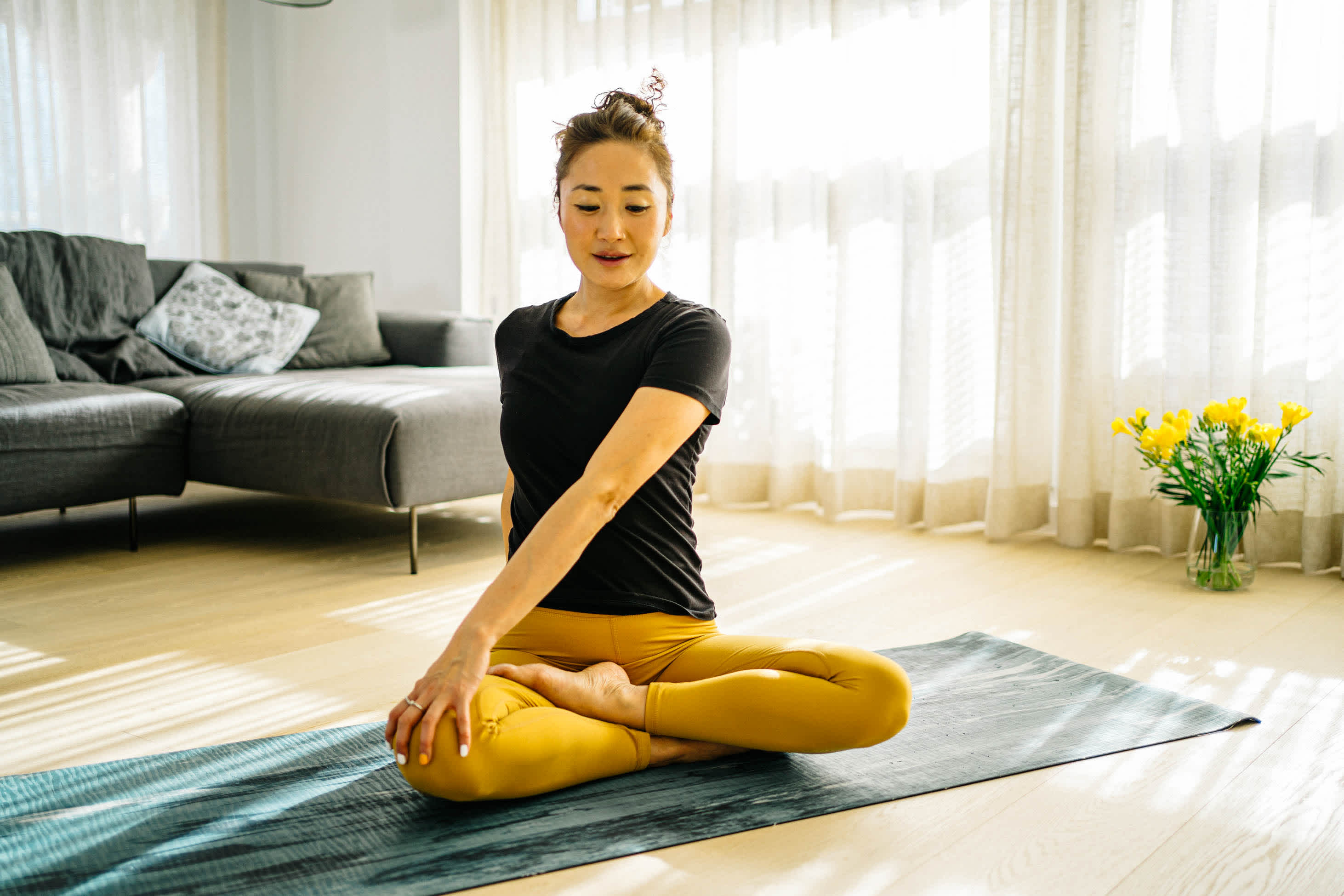Work, Life, Balanced
How Spending 13 Minutes a Day on Self-Care Changed My Life
By Melanie Lockert — Jan 5, 2021

A couple of months ago, I plopped into bed. As I reviewed my day, I realized that I didn’t do anything for myself all day (yet again).
No exercise: The most movement I had all day was walking to the kitchen.
No “me time”: The only minutes I had to myself were the short bathroom breaks throughout the day.
No real money management: Due to stress and mental health issues like depression and anxiety, I was spending carelessly and lost the habit of checking in with my finances.
As the world seemed to be going from bad to worse, I felt the toll on my mental health. Being self-employed, work only ever seemed to get tougher and more precarious. I had the feeling I always needed to be working and I was burnt out.
The term “self-care” comes with so much baggage and has been hijacked by brands to try to sell us something. But if I’ve learned anything in therapy, it’s that if I’m not well, nothing in my life is. So I knew I had to do something to engage in self-care that was meaningful, easy and free.
I wanted to start small and commit to something that required minimum input with maximum output.
That’s when I decided to create the Mental Health and Wealth Challenge. I decided to focus on mental, physical and financial health as these pillars are the foundation for so much in life and when they’re out of balance, everything else seems to be, too.
The Mental Health and Wealth Challenge
In an effort to get things moving in my life, both physically and mentally, I decided to start my challenge with The New York Times’ 7-minute HIIT workout. True to its promise, in just seven minutes it got my heart pumping.
I had tried to get a meditation practice going to ease my anxiety, but I’d been sporadic at best. So for my challenge, I asked: What if I could just commit to five minutes of meditation?
To round out the challenge, I wanted to focus on personal finance and start reviewing my financial situation again.
Once the pandemic hit, everything has gone haywire. (Here are common behavior problems kids are experiencing due to the pandemic—and what to do about them.) Checking in on my finances was put on the back burner. So for one minute, I’d comb through my bank transactions and expenses to see where my money was going. This was just the start of getting back into a routine, but in just one minute, I could at least build the habit.
So I resolved that every day I would start with:
Seven-minute workout
Five minutes of meditation
One minute checking my bank transactions
That’s only 13 minutes.
I used technology to help me pull it off: I downloaded a seven-minute workout app (there are a ton of them), the free meditation app Insight Timer for a five-minute meditation (you might choose something similar as well, like Calm or Headspace) and Charlie to comb through my finances (you could also use something like Mint).
To measure whether this challenge was making a meaningful impact on my life, I rated my mood before my morning session and after, on a scale of 1 to 10.
One Week of Daily Self-Care
I took notes throughout the challenge. Here’s a breakdown of how it went.
Day 1
I am feeling pretty ready to start this challenge. I know I can commit 13 minutes to myself! As I start exercising, I realize I am moving parts of my body that haven’t moved in months, and it feels good. During the meditation, I feel like it’s hard to stay still but closing my eyes feels good. I check my finances and am OK with the numbers but realize I could get less takeout.
Mood before: 7
Mood after: 9
Day 2
Today I am tired as I didn’t sleep that well. I am not feeling as motivated as Day 1. The exercise feels hard but I remember it’s just seven minutes. I think to myself, I can do this, I can get through seven minutes. The meditation feels like a treat after exercising.
Mood before: 5
Mood after: 7
Day 3
I am getting into the groove and ready to take 13 minutes for myself. As I do the seven-minute workout, my body is starting to wake up. I am feeling the progress of doing it three days in a row. The meditation centers me and focuses my unwieldy thoughts. When I check my finances, I see a recurring charge that I should cancel.
Mood before: 7
Mood after: 8
Day 4
I wake up on the wrong side of the bed. The onslaught of bad news about the economy and lingering effects of the pandemic feels like too much. I don’t want to do anything except stay in bed. I force myself to do the 13 minutes. I hate it the entire time but remind myself I can do anything for 13 minutes.
Mood before: 2
Mood after: 3
Day 5
I am feeling better than the day before after a good night’s sleep. The exercise is getting easier and the meditation is, too. I feel empowered by keeping tabs on my finances and knowing where my money is going. This simple act is helping me build positive habits and making me more mindful of my spending and what changes I want to make.
Mood before: 6
Mood after: 8.5
Day 6
I am starting to get into the habit of this. I wake up and look forward to spending 13 minutes on self-care. Today the exercise burns a little after so many days of consistent workouts. I’m surprised how much I feel after just seven minutes! Today I choose a meditation around focus to start the day. Not much has changed in my finances but I feel good making sure there are no instances of fraud or any errors.
Mood before: 7
Mood after: 8
Day 7
I am starting to feel the cumulative effects of taking just 13 minutes for myself. The exercise feels harder today and I hate doing the plank. But it’s just 30 seconds and then the next exercise. Before I know it, it’s time to meditate. Today I find a five-minute meditation centered on getting rid of stress and learn a new breathing technique. I am starting to notice the trends in my spending. I tend to spend the same amount at the grocery store each week and get take out a couple of times a week. This week my coffee spending is up and I’d like to cut it in half.
Mood before: 5
Mood after: 8
How 13 Minutes of Self-Care Changed My Life
When I started, I wondered if 13 minutes would actually make a difference. But after one week of focusing on my physical, mental and financial health I can unequivocally say yes. Every single day, I felt better after doing the challenge. Some days more than others, but there was always an increase.
Now that I’ve felt the positive effects, I have committed to taking care of myself every day. If I spend more than 13 minutes on Instagram, I can certainly invest, at a minimum, 13 minutes on self-care.
Are you a busy parent at the whim of crying children and other demands? You might try squeezing these 13 minutes into naptime or breaking up the three components (physical, mental and financial) over the course of the day whenever there’s a spare moment. If your kids wake up too early for you to feasibly fit this in as a morning routine, you might also try this challenge as a wind-down routine before bed.
Because being a parent involves so much taking care of others, it’s especially important to invest a little time in yourself, too.
Now that I’ve been doing this for a couple of months, I feel more steady and stable and less like I’m dealing with a roller coaster of emotions. I feel less resentful about work, too.
Some days, I do even more and include a walk and 20 minutes of reading at some point throughout the day. The beauty is that it doesn’t have to be consecutive. It can be broken up into chunks throughout the day. My biggest takeaway has been simply to remember balance in my life, and do what it takes to pursue it.
If you’re having trouble summoning the energy to really set this time aside, try just a few days and keep a journal to see for yourself—if my experience is any indication, I bet you’ll always feel better afterward. Ready to make this a reality for yourself? Here are ideas you can implement in your own life for 30 days of self-care for parents.
Fabric exists to help young families master their money. Our articles abide by strict editorial standards.
Information provided is general and educational in nature, is not financial advice, and all products or services discussed may not be offered by Fabric by Gerber Life (“the Company”). The information is not intended to be, and should not be construed as, legal or tax advice. The Company does not provide legal or tax advice. Consult an attorney or tax advisor regarding your specific legal or tax situation. Laws of a specific state or laws relevant to a particular situation may affect the applicability, accuracy, or completeness of this information. Federal and state laws and regulations are complex and are subject to change. The Company makes no warranties with regard to the information or results obtained by its use. The Company disclaims any liability arising out of your use of, or reliance on, the information. The views and opinions of third-party content providers are solely those of the author and not Fabric by Gerber Life.

Written by
Melanie Lockert
Related Posts
Work, Life, Balanced
CFPs, Money Coaches and More: Which Financial Professional Is Right for You?
A financial professional can help you manage your money. What type of financial pro you need can depend on the kind of help you’re looking for.
By Jessica Sillers
Work, Life, Balanced
What Parents Need to Know About Taxes in 2025
Tax credits or deductions can help families lower taxes and keep more money to enjoy with your kids.
By Jessica Sillers
Work, Life, Balanced
Does Your Partner Lie About Money? Ways to Find—and Fix—Financial Infidelity
Financial infidelity, or being dishonest about money with your partner, can affect your finances and relationship. Spot unhealthy patterns and learn ways to build money habits that strengthen your bond.
By Jessica Sillers
Fabric Picks
Life insurance
How to Juggle Long-Term Financial Goals When You’re in the Thick of Parenting
It can be hard to save when current expenses take priority. Tips to save for retirement and manage a family budget.
By Jessica Sillers
Saving/Investing for Kids
How to Do 30 Days of Financial Self-Care as a Parent
Self-care comes in many forms, including how you handle your money. See how small steps may add up to help improve your financial well-being.
By Jessica Sillers
Life insurance
What to Do at the End of Your Life Insurance Term
Term life insurance, by definition, ends. Check that you’re ready for a smooth transition out of your policy, or take steps to continue the best coverage fit for you.